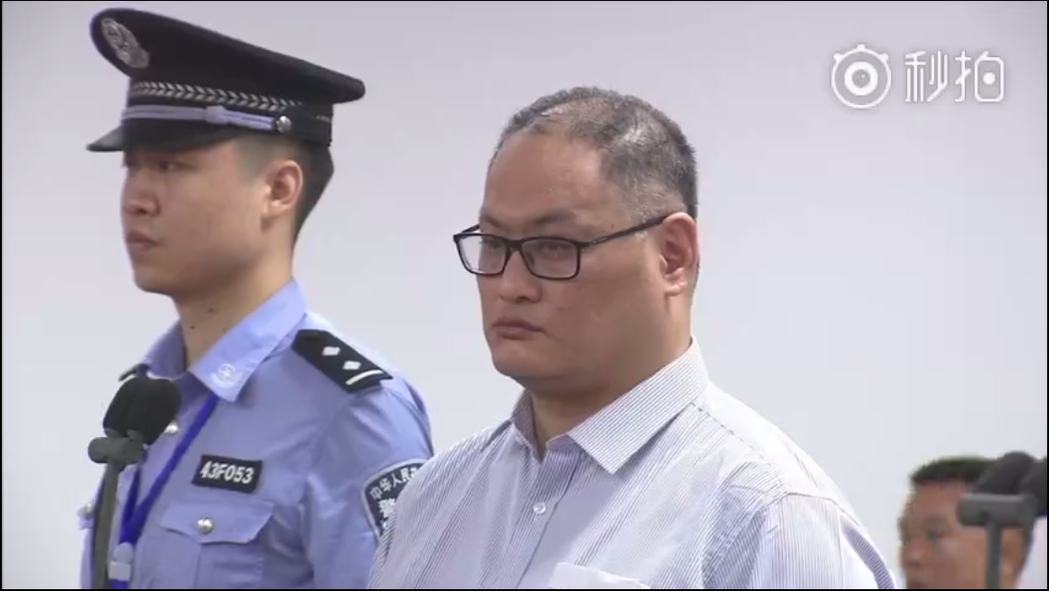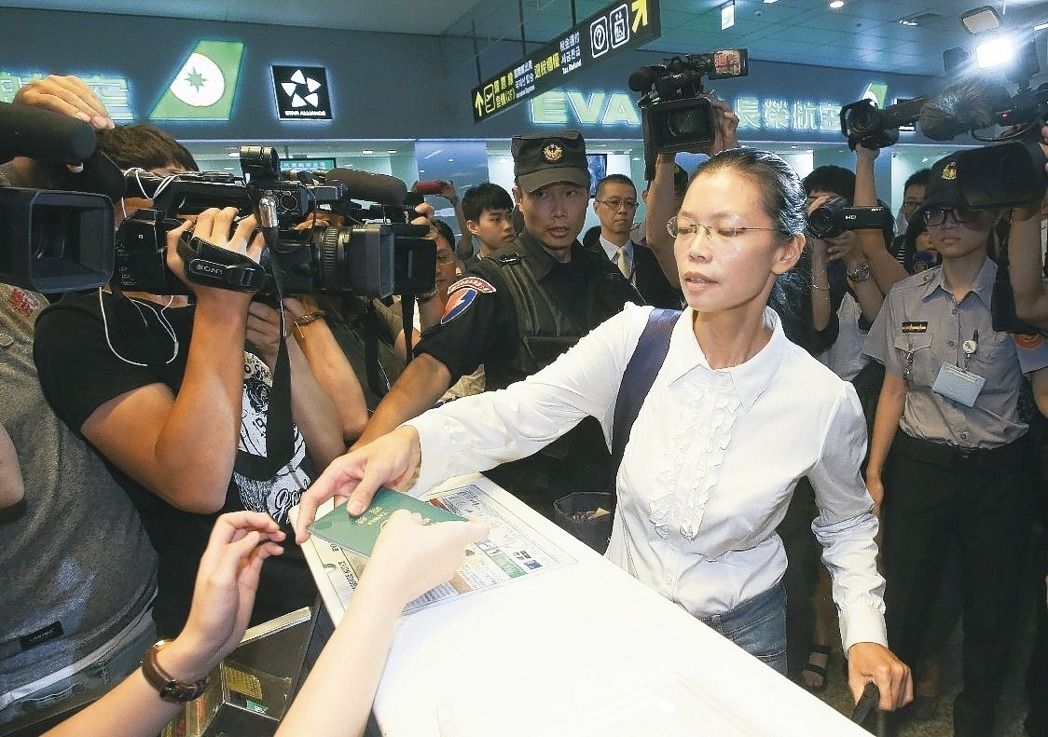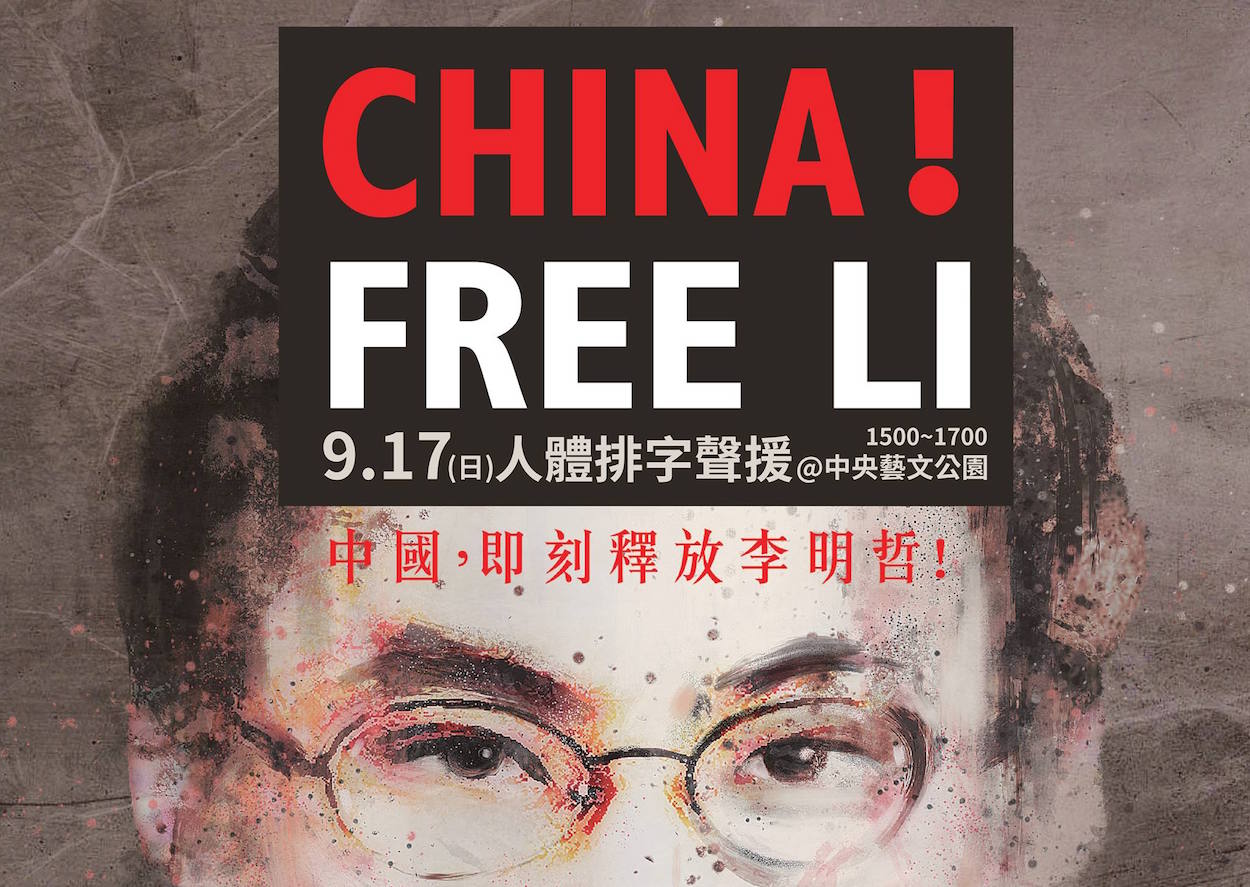by Brian Hioe
語言:
English
Photo Credit: UDN
OUTRAGE HAS broken out in Taiwan with the appearance of detained Taiwanese human rights advocate Lee Ming-Che in Chinese courts yesterday. Lee pled guilty to “subverting state power” and undermining the authority of the CCP in attempting to encourage multi-party in democracy. Lee, who is 42, disappeared while crossing over into China from Macau on March 19th, leading to suspicions that he had been detained by China. Such suspicions were confirmed a week later, when China confirmed that it had arrested him on charges of attempting to subvert the Chinese state. Yesterday was the 176th day since his detention began.
It remains unknown as to the true reasons as to why China detained Lee. A long-time human rights worker, Lee was also a former staffer of the DPP, which some suspect may have played a role in China’s decision to arrest him—as a means of sending a warning to the current Tsai administration. For his part, Lee’s wife, Lee Ching-Yu, has maintained that Lee was attempting to share the experience of Taiwan’s democratization with China, seeing as Lee regularly held discussions with Chinese friends about the experience of Taiwanese democratization. It is possible that this was what led to Lee’s detention. Some have also speculated that Lee may have been caught in the dragnet of China’s recent attempts to crack down on foreign NGOs in China, seeing as Lee would be the first foreign NGO worker to be detained in China. A Chinese man, Peng Yuhua, stood trial next to Lee yesterday but, compounding confusion, Lee’s Chinese friends claim not to know him.
 Lee Ming-Che while appearing in court. Photo credit: Weibo
Lee Ming-Che while appearing in court. Photo credit: Weibo
Lee’s wife, Lee Ching-Yu, who was in attendance at the trial, took an active role in attempts to secure Lee’s release, including travelling to America to try to persuade American government officials to take actions regarding Lee’s detention and to urge action from the UN Human Rights Council’s Working Group on Enforced or Involuntary Disappearances. But intimidation attempts by China took place in the lead-up to the trial. Apart from previous attempts to enter China to search for her husband which were blocked by China, Lee Ching-Yu was previously contacted by a third-party “broker” claiming to act on behalf of the Chinese government, Lee Chun-Min. However, Chinese law allows for immediate family members to attend trials, which was why Lee Ching-Yu was allowed into China this time for Lee’s trial.
Lee Chun-Min claimed that if Lee Ching-Yu gave up plans to travel to China, her husband would soon be released, but that if she persisted in such plans, a forced confession would be extracted from her husband and broadcasted on television. The intervention of Lee Chun-Min led to allegations by Lee Ching-Yu that the KMT was colluding with China to try and resolve the incident through the under-the-table negotiations and in that way bury it, seeing as Lee Chun-Min, a Taiwanese man previously imprisoned in China for decades for spying, was once an aide of Alex Tsai of the KMT and Tsai confirmed in public statements that he had reached out to acquaintances in China to try and address the situation.
 Lee Ching-Yu while heading to China. Photo credit: UDN
Lee Ching-Yu while heading to China. Photo credit: UDN
Likewise, actions by China also seem to have been aimed at splitting the Lee family. It is generally thought that the Lee family is probably divided along identity lines, between family members that identify with Taiwan and family members that identify with China, as well that the Lee family is divided between members of the pan-Green camp such as Lee Ming-Che himself and members of the pan-Blue camp. Lee Ming-Che himself was a former member of the pan-Blue New Party before a presumed shift in views on identity led him to become a staffer at DPP headquarters. Lee Ching-Yu herself is a staffer at the Shih Ming-Teh Foundation, Shih Ming-Teh having been a former head of the DPP and a significant figure in the Taiwanese democracy movement as a political prisoner, but a political figure not completely supportive of Taiwanese independence, and a vocal critic of members of the DPP on grounds that many view as conspiratorial in nature.
 Lee Ching-Yu holding up the words, “Lee Ming-Che, I am proud of you”, newly tattooed on her arms. Photo credit: Whereislee.org
Lee Ching-Yu holding up the words, “Lee Ming-Che, I am proud of you”, newly tattooed on her arms. Photo credit: Whereislee.org
Obviously, it would look good for China is Lee Ming-Che’s mother were to try and overshadow her daughter-in-law in terms, to express lack of support for her son’s actions, and to urge compliance to China from her son, which was why Lee Ching-Yu seems to have gone public regarding some of the inner family turmoil of the Lee family following Lee Ming-Che’s arrest. As for Lee Ching-Yu, in order to express support of her husband’s actions, Lee notably went into the trial with the words, “Lee Ming-Che, I am proud of you” newly tattooed on her arms in calligraphy so that she could hold them up during the trial, seeing as she would not be allowed to speak during the proceedings.
In retrospect, Lee’s confession of guilt yesterday may not be truly surprising. Extracted confessions of guilt from political prisoners are nothing new for China, as seen in the televised confessions of guilt extracted from Hong Kong booksellers who published books critical of the Chinese government. At the very least, in Lee’s case, the Chinese government stuck to charges which were not attempts to smear Lee outright and based on his activities within China, whereas Hong Kong booksellers were arraigned on charges of having committed crimes within the Chinese mainland, such as implausible claims of having killed a student in a hit-and-run incident in the case of Gui Minhai.
 Photo credit: UDN
Photo credit: UDN
With regard to the overall case, it proves a question as to what China wishes to accomplish through brute force tactics. One can only imagine that the case will push Taiwan further away from China, instead of intimidating Taiwan into compliance with Chinese territorial claims. But China generally adopts a hard line with regard to countries or territories it considers as part of itself but which have independence movements, whether this is in the cases of Hong Kong, Tibet, or Xinjiang. Most of the time, despite China’s efforts, this only fans up dissent against China and so China’s actions to bring what it considers separatist territories in line with its will are strangely self-undermining. This may simply be the contradictory logic of authoritarianism, in which state actors most often recourse to force before any other options, and diplomacy is rarely if ever on the table.
Nevertheless, in Taiwan, the Tsai administration has also received no small amount of criticism over its weak response to the trial. While government actors expressed disapproval of China’s actions and stated that they would do all they could to secure Lee Ming-Che’s release, this was primarily done in a low-key manner. Presumably, the Tsai administration does not wish to rock the boat too hard on cross-strait relations at present, but this strikes as a valuable opportunity for Taiwan to distinguish itself from China on the international stage which has been wasted. One does not imagine cross-strait relations between Taiwan and China could erode much further than it has in the present and, if Tsai Ing-Wen had made a high-profile statement on the matter, Tsai’s response would have likely been seen as a bold and decisive one which could have gone towards bolstering her credentials as an effective and charismatic leader on the world stage.
 Poster for the Free Lee rally planned in Taipei this Sunday
Poster for the Free Lee rally planned in Taipei this Sunday
The Tsai administration has primarily taken a low-key stance on the matter, which is why it has largely fallen to smaller pan-Green political parties such as the New Power Party, former leaders of the Sunflower Movement, and civil society groups to take action to call for Lee Ming-Che’s release. And so it remains what steps are to be next taken in terms of calling for Lee’s release. International pressure is likely what will be needed to in order to secure Lee’s release. But apart from lack of decisive action by the Tsai administration, America, whose support is often needed to secure the release of political prisoners internationally, is notably disinterested in using the discourse of human rights to leverage against China under the Trump administration.
The road to Lee Ming-Che’s release may be a long one then. At present, a rally is planned for this Sunday afternoon at Central Culture Park in Taipei. Activities are also planned in New York regarding the meeting of the UN Human Rights Council’s Working Group on Enforced or Involuntary Disappearances and this year’s Keep Taiwan Free/UN For Taiwan rally. The effect of these will have to be seen.

